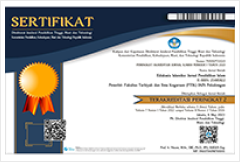Predicting Students’ Academic Achievement on the Patterns of Tahfidz al-Qur’an Programs in Public Universities
DOI:
https://doi.org/10.28918/jei.v5i2.1072Keywords:
Students’ Academic Achievement, Tahfidz Programs, Qur’anAbstract
The present study reports student activities of tahfidz al-Qur’an at a public university in East Java, Indonesia, explores obstacles in enacting tahfidz programs, and examines the relationship between tahfidz activities and academic achievement. Grounded in mixed-methods, a qualitative approach was undertaken to describe patterns of tahfidz activities and problems, whereas the quantitative one was employed to measure the relationship between tahfidz activities and academic achievement. 25 students of tahfidz programs in four faculties volunteered to participate in the study. Data were collected through interviews and academic achievement documents. Study findings expose that there were three types of tahfidz students with numerous activity patterns, i.e. giving additional memorization, muraja’ah, and memorizing fluency using talaqqi-musyafahah and tasmi’-muraja’ah methods. Another result portrays that tahfidz students’ problems relied on time management, the lack of meeting intensity between students and their ustadz/teachers, the unsupported atmosphere, and the memorization method that did not optimize multiple intelligence. This study also reveals the fact that the tahfidz activities and academic achievement had a significant correlation (p < .01). It indicates that if the activities of tahfidz al-Qur’an encouraged, the student’s learning achievement would leverage as well
References
Al Maududi, A. A., Mujahidin, E., & Hafidhuddin, D. (2014). Metode Tahfizh Al-Quran Bagi Pelajar dan Mahasiswa. Ta’dibuna: Jurnal Pendidikan Islam, 3(1), 1-15. https://doi.org/10.32832/tadibuna.v3i1.568
Akbar, A. & Hidayatullah. (2016). Metode Tahfidz al-Qur’an di Pondok Pesantren Kabupaten Kampar. Jurnal Ushuluddin, 24(1), 91–102. https://doi.org/10.24014/jush.v24i1.1517
Arif, M., & Nggolitu, I. (2019). Hafidz Qur’an and Its Influence toward High School Students Learning Achievement in Indonesia. Ijtimā’iyya: Journal of Muslim Society Research, 4(2), 175-196. https://doi.org/10.24090/ijtimaiyya.v4i2.2840
Budi, A. S., & Mahpur, M. (2014). Dinamika Psikologis Istiqomah pada Santri Hamilil Quran Pondok Pesantren Madrasatul Qur’an Tebuireng. Psikoislamika: Jurnal Psikologi Dan Psikologi Islam, 11(1), 1–4. https://doi.org/10.18860/psi.v11i1.6377
Fauziah, R. F. A. (2020). Korelasi Tsiqah Tahfidz al-Qur’an dengan Maharah Al-Lughah Al-‘Arabiyyah Mustawa Tsalits Ma’had Az-Zubair bin Al-Awwam. El-Tsaqafah, 19(1), 25–36. https://doi.org/https://doi.org/10.20414/tsaqafah.v19i1.2342
Firdausi, F. (2017). Optimasi Kecerdasan Majemuk Sebagai Metode Menghafal Al-Qur’an (Studi atas buku “Metode Ilham: Menghafal al-Qur’an serasa Bermain Game” karya Lukman Hakim dan Ali Khosim). Jurnal Studi Ilmu-Ilmu Al-Qur’an dan Hadis, 18(2), 189-210. https://doi.org/10.14421/qh.2017.1802-03
Ginanjar, M. H. (2017). Aktivitas Menghafal Al-Qur’an dan Pengaruhnya Terhadap Prestasi Akademik Mahasiswa (Studi Kasus Pada Mahasiswa Program Beasiswa Di Ma’Had Huda Islami, Tamansari Bogor). Edukasi Islami: Jurnal Pendidikan Islam, 6(11), 20-32.
Julianto, V., & Etsem, M. B. (2015). The Effect of Reciting Holy Qur’an toward Short-term Memory Ability Analysed through the Changing Brain Wave. Jurnal Psikologi, 38(1), 17–29. https://doi.org/10.22146/jpsi.7661
Nafisah, M. (2019). Tipologi Resepsi Tahfiz al-Qur’an di Kalangan Mahasiswi IIQ Jakarta. Ilmu Ushuludiin, 6(2), 197–215. https://doi.org/DOI: https://doi.org/10.15408/iu.v6i2.13929
Santika. (2020). Faktor-faktor yang Mempengaruhi Prestasi Akademik Mahasiswa. Jurnal Pendidikan, 21(1), 1–17. https://doi.org/10.33830/jp.v21i1.704.2020
Suwandi & Wahyudi, R. (2020). Pengaruh Hafalan Al-Qur’an Terhadap Prestasi Akademik mahasiswa FAI Universitas Ahmad dahlan Yogyakarta. MUADDIB: Studi Kependidikan Dan Keislaman, 10(01), 21–44. https://doi.org/http://dx.doi.org/10.24269/muaddib.v1i1.1760
Trinova, Z., & Wati, S. (2016). The Contributions of Quranic Tahfidz to Mental Health. Al-Ta Lim Journal, 23(3), 260–270. https://doi.org/10.15548/jt.v23i3.243
Zahid, M. (2012). Perbedaan Pendapat Para Ulama tentang Jumlah Ayat Al-Qur’an dan Implikasinya terhadap Penerbitan Mushaf Al-Qur’an di Indonesia. Nuansa, 9(1), 26–46.
Zulkurnaini, N. A., Kadir, R., Murat, Z., & Isa, R. M. (2012). The Comparison between Listening to Al-Quran and Listening to Classical Music on the Brainwave Signal for the Alpha Band. Proceedings of IEEE 2012 Third International Conference on Intelligent Systems Modelling. 181–186. https://doi.org/10.1109/ISMS.2012.60






















